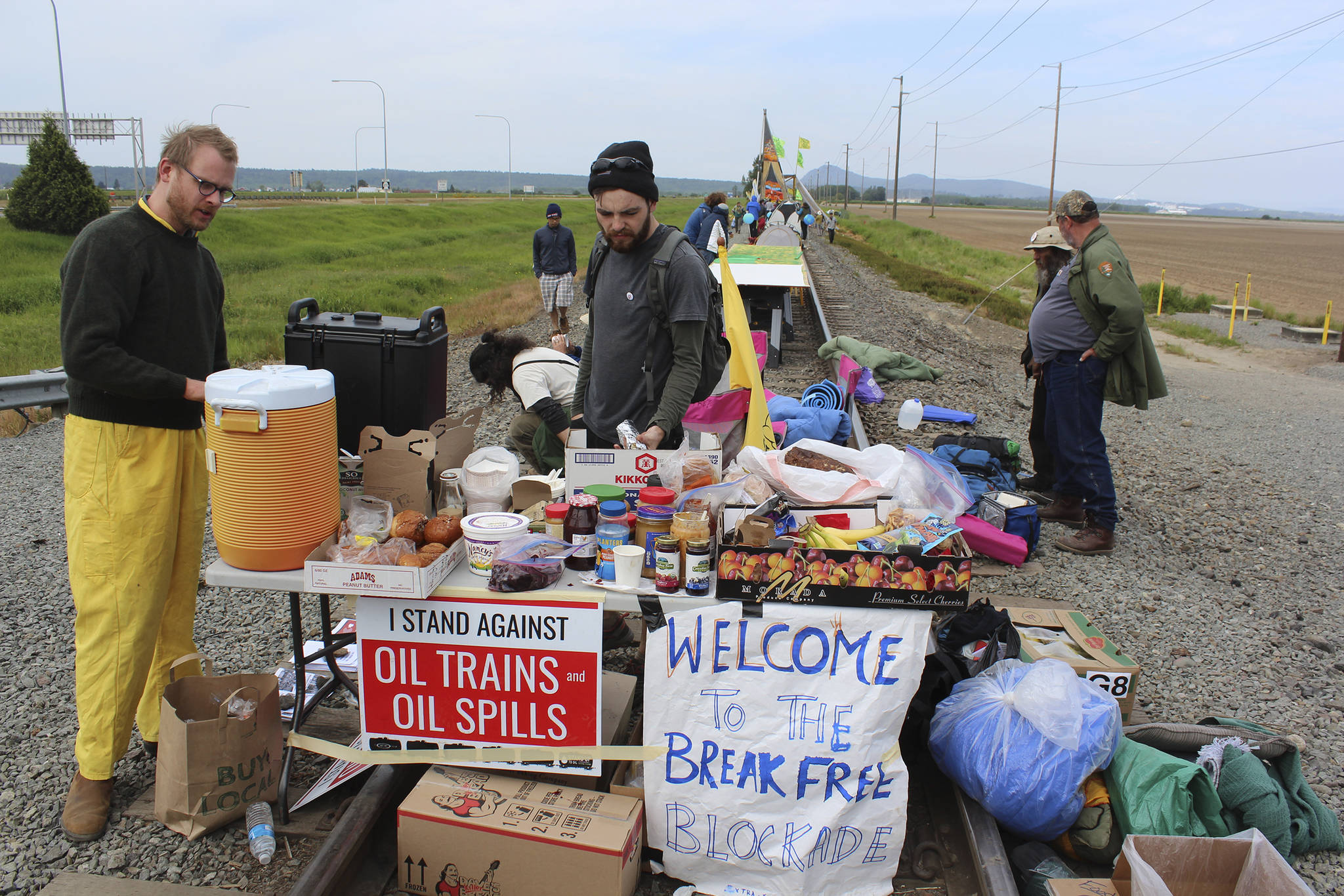Last May, thousands of people flocked to Anacortes to stage a massive, three-day climate protest at the site of the two largest oil refineries in Washington state. Hundreds pledged to commit civil disobedience there, and sure enough, 52 were arrested in the wee hours of the final morning for refusing to leave the oil-train tracks they’d occupied for 36 hours.
“We don’t have any more time to see if world leaders are going to fix this,” said Ben Joldersma, a Seattle resident and father of three, at the time. He was among the 52 arrested and the six defendants tried last week.
Most of the 52 were ultimately charged with second-degree criminal trespass, a misdemeanor that carries a light penalty: A $250 fine and an eight-hour community service requirement. This spring, as their Skagit County trials began (there will be seven in total), jury after jury served each set of defendants their small convictions, regardless of any climate-crisis or legal arguments they or their lawyers made.
But on Friday, during the fifth trial, two jurors refused to do so — despite what Joldersma describes as an unsympathetic judge and aggressive prosecutor. “The presumption of guilt was palpable” in the courtroom, he says. From his point of view, “The judge clearly thought we were guilty. To me, it seemed like she felt like she was going through the motions.” The only arguments jurors were instructed to hear from the defense were “common sense” ones, rather than anything regarding specific wording of any law, Joldersma says; he felt as though he spent two days “basically listening to 95 percent of the objections by the prosecution be sustained, and ours be overruled.”
The facts of the case were never in question; all defendants claimed they were sitting on those train tracks at that time. They just said they did so because the climate crisis demands it.
And two of the jurors, including Skagit County resident Karen Swan, believed them. “I want to thank you from the bottom of my heart for your stand and your risk, I’m honored to have been a juror in your case,” Swan said, in a statement to the defendants. “I can very much relate to you in regards to the emotional pain I feel about our world and the destruction of people and the environment.”
Swan added later in an email to Seattle Weekly that what also ultimately led her to vote for acquittal was that local law enforcement and BNSF Railway had been invited to planning meetings with organizers up to two months prior to the event. They’d had ample time to prepare, she thought. “As planned, BNSF ran extra deliveries to the oil refinery the week before the protest,” she wrote. “The understanding was that the tracks would be clear for the weekend and would resume normal business the following Monday… Putting myself in the shoes of the protestors, I would’ve been completely confused. I would’ve expected BNSF to be the ones to announce and/or write a statement as to the need to disperse prior to 5 a.m. … Why would there be so much cooperation from all parties prior to the event and then suddenly 5 a.m. Sunday morning protestors were treated as criminal trespassers? A simple statement would’ve changed the circumstances in my mind.”
Climate concerns aside, then, Swan still felt she couldn’t convict, and the jury hung. But the prosecution didn’t hestitate; they moved immediately for a retrial. A scheduling hearing is set for May 2. And that’s unusual, defense lawyers say: “It’s virtually unheard of for a state’s attorney’s office to retry a nonviolent misdemeanor civil disobedience case,” said attorney Lauren Regan in a statement, “especially when the state has already received its ‘pound of flesh’ by convicting others engaged in the same action.”
Of course, the defendants face tiny penalties. Blocking an oil train is still a misdemeanor in Washington state. Although Senator Doug Ericksen, R-Ferndale — now working for both the Washington state legislature and the Trump administration — sponsored a bill before the start of the 2017 session that would have made such protests Class C felonies, it didn’t go anywhere.
Turning an emergency shutoff valve on a major pipeline incurs multiple felony charges, however — punishable by up to three decades in prison. Ken Ward, one of the five climate activists who closed the valves on five pipelines across the country last fall, will go back to trial in Skagit County on May 22. His late-January trial also resulted in a hung jury, though he was not allowed to present the “necessity defense” and the judge in his case pointed to “tremendous controversy over … whether [climate change] even exists.”
For Joldersma, the need for lawbreaking in the name of climate change is more than self-evident. During cross-examination, the prosecution asked him if he, an educated adult, knew that “it is not OK to camp on tracks.” He said, “I do think this is very OK. I think it’s more than OK…. This is one of the most OK things I’ve ever done in my life.”
sbernard@seattleweekly.com
This post has been updated.








